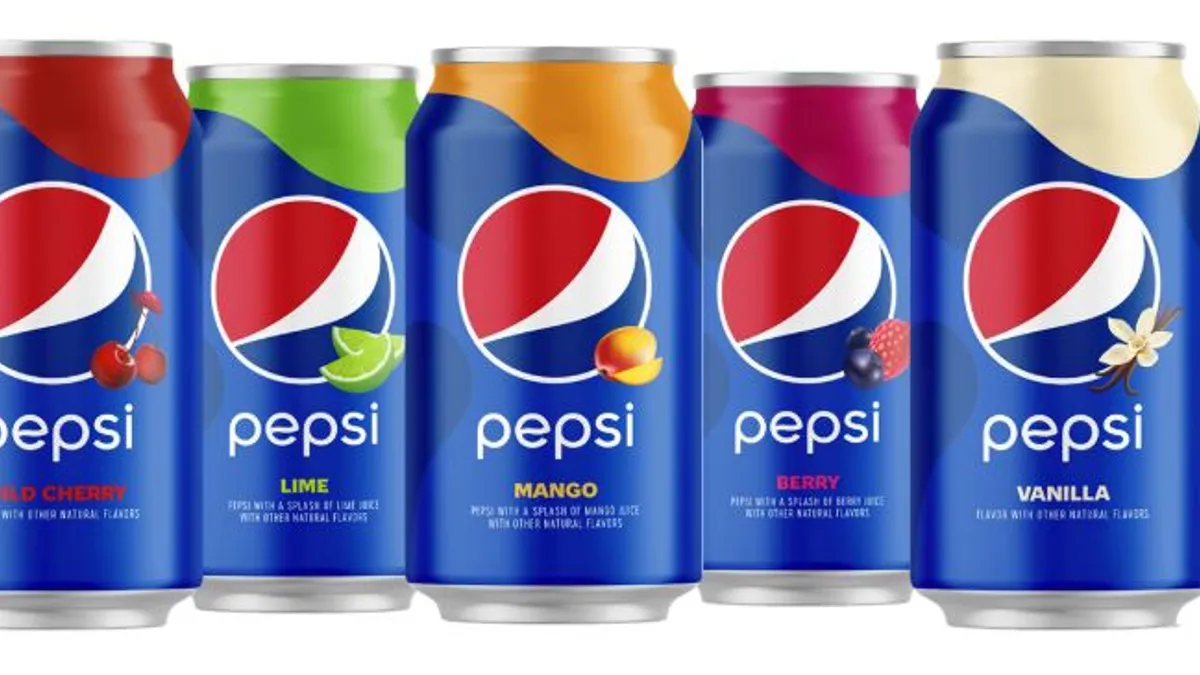Dive Brief:
- PepsiCo executives said in a conference call with analysts this week that the company has increased its advertising and marketing spending by 12% this year, helping to drive higher sales across a number of brands and boosting market share for key brands like Pepsi. The food and beverage giant said net sales rose 4.3% to $17.2 billion in Q3 from a year earlier, while expenses climbed more than 8% to $6.6 billion and pushed net income down by 16% to $2.1 billion, per a quarterly report.
- The company is capturing more consumer-level data to help personalize its marketing by better understanding consumers at the household or individual level so it can increasingly structure personalized communications, according to the call.
- Omnichannel retail is also a focus, with the company having an e-commerce sales goal of $2 billion this year. To help it get there, PepsiCo is investing in its go-to-market and supply chain systems to take advantage of retail opportunities. The company also discussed a five-part "purpose" plan focused on initiatives to build a sustainable food system.
Dive Insight:
PepsiCo's Q3 results highlight the positive results from a concerted effort to drive sales through higher investments in marketing and advertising. The list of successes includes Gatorade Zero surpassing $500 million in North American sales since its May 2018 launch and the Bubly brand of flavored seltzers, which is expected to be a billion-dollar brand as it gains share against competitors like La Croix, CNBC reported. PepsiCo division Frito-Lay North America, whose brands include Doritos, Cheetos, Ruffles and Fritos, increased revenue by 5.5% from the prior year and double-digit growth was seen for healthier snack brands such as Bare and Off the Eaten Path.
PepsiCo's focus on leveraging customer data for more personalized marketing is reflected in last month's rollout of a loyalty program that offers cash back to consumers through PayPal and Venmo. The PepCoin rewards program helps PepsiCo to capture more data about its most dedicated customers, and harness that information for its marketing strategies. By working with PayPal and its mobile payment platform Venmo, PepsiCo also can reach younger consumers who are more familiar with mobile payments.
PepsiCo's marketing and advertising bets have included rejuvenating some of its older brands. PepsiCo's Fritos corn chips last week returned to advertising with a digital-only campaign that marks its first creative effort since 1971. The campaign is focused on social media to reach tech-savvy younger audiences who are most likely to interact with on mobile devices. Earlier in the month, Lay's Potato Chips introduced its first redesigned packaging since 2007 to emphasize imagery that younger consumers may most associate with Instagram.
Alongside these efforts, PepsiCo continues to invest in some tried-and-true approaches, like reaching passionate football fans, such was with its "Always Be Celebrating" campaign to celebrate the NFL's 100th anniversary. Pepsi will sponsor the Super Bowl Halftime Show and be featured in NBC's "Sunday Night Football."
Efforts by PepsiCo to reach younger Generation Z consumers tap into some of the key insights about this group, including their aversion to traditional ads and the fact that they are more socially conscious than older generations, and tend to favor brands that demonstrate a purpose.
To reach ad-adverse Generation Z, PepsiCo's Doritos brand of flavored tortilla chips last month ran a campaign that removed its logo from its advertising and urged fans to create content inspired by the campaign and share it on social media.
Regarding social purpose, PepsiCo CEO and chairman Ramon Laguarta discussed during the conference call a plan to promote sustainable agriculture, water conservation and healthier eating while reducing plastic waste and greenhouse gas emissions. PepsiCo also aims to advance human rights, to promote diversity and inclusion in the workplace and to increase the earnings potential of women, he said.













